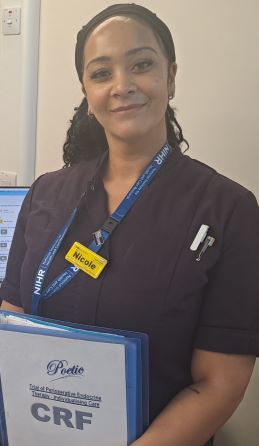Monday 28 October
Breast cancer is the most common cancer nationwide, with figures showing around 56,000 new cases in women in the UK every year. That’s more than 150 cases every day.
 It’s why designating October as Breast Cancer Awareness month is so important, using these four weeks to highlight what to look for and how to check your body.
It’s why designating October as Breast Cancer Awareness month is so important, using these four weeks to highlight what to look for and how to check your body.
Screening programmes, an early diagnosis and improved treatments have all helped provide better outcomes in battling the disease. Across Frimley Health, teams are researching ways to advance breast cancer treatments further, with different clinical trials exploring how to improve patients’ recovery.
“The research aims to evolve cancer treatments,” said clinical research practitioner Nicole Kader (pictured). “We want to improve patient pathways to the best possible care.
“There’s no ‘one-size fits all’ approach with breast cancer, and each clinical trial helps us understand the best course of treatment that can be offered for each patient we see.”
For some patients, being part of a research trial has helped provide a positive focus during a very difficult time.
“I feel I’m contributing to the wellbeing of people needing treatment in the future,” said Lydia*.
“To be told that you have cancer is scary. But to be part of a study that helps others and informs better treatments makes you feel that you are not alone,” said Catherine*.
The research studies look at getting the best benefits from treatments involving radiotherapy, hormone replacement therapy and chemotherapy, as well as surgical options.
The ATNEC trial is recruiting across Frimley Health, studying the effectiveness of neoadjuvant chemotherapy at shrinking and removing cancer cells in lymph glands.
“The chemotherapy is now able to get rid of cancer that has spread to armpit glands in 40-70% of patients,” said Teena Kunnath, CRP on the study at Frimley Park Hospital. “The trial is looking to see if this could mean further armpit treatment, which can have long-term side effects, can potentially be avoided for a patient’s recovery.”
If the research proves successful, the study could change clinical practice nationally, helping some breast cancer patients avoid a further invasive procedure and adverse side effects.
A new study that will soon be opening at Frimley Health is the PERLE trial, which will monitor the next generation of breast implants.
“We hope participation in this study will improve knowledge of outcomes for our breast cancer reconstructive patients,” said clinical research nurse Alexandra Edwards.
“We need to be sure medical devices such as breast implants are safe and effective for use. The nano-textured surface of the Perle implant was developed to reduce the risk of a rare implant-associated lymphoma, as well as helping to reduce capsular contracture, when breast tissue hardens painfully around the implant.”
Advice for anyone with new breast symptoms or concerns is to contact their GP. For information on self-check awareness, visit https://coppafeel.org/. For information about joining a Frimley Health research study, please contact fhft.research-innovation@nhs.net.
*Names changed for patient anonymity.

